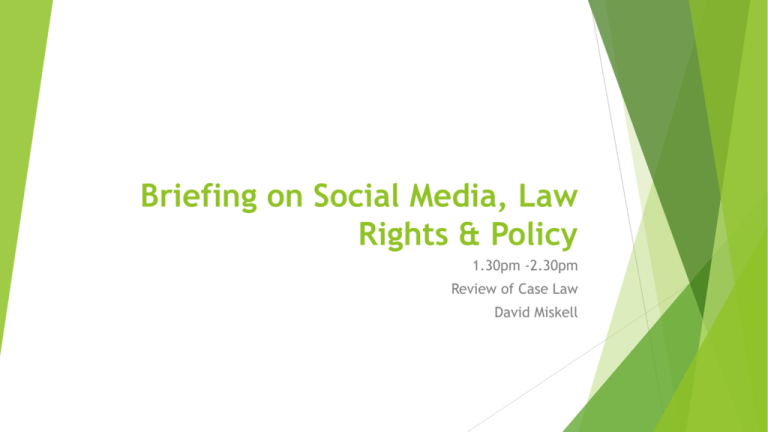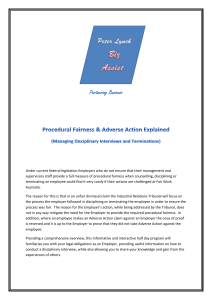Briefing on Social Media, Law Rights & Policy
advertisement

Briefing on Social Media, Law Rights & Policy 1.30pm -2.30pm Review of Case Law David Miskell Prevalence of Social Media in Workplace Peninsula Survey 2011– 67% of employees admitted to accessing Social Media sites during working hours 73% of employees admitted to making negative comments about management/the company on Social Media sites. TUC – referred to Facebook as 3.5 million HR accidents waiting to happen. Case Law Issues Employer/Employee Reputation Employer Liability Extent of Publication/Dissemination Privacy The existence of policies. Case Law Issues contd. Recruitment/Selection During employment End of Employment/Ownership of Social Media Platforms. Conclusions Recruitment Stage A 2009 US survey by Harris Interactive on behalf of careerbuilder.com found that of 2,600 “hiring managers” surveyed, 45 per cent had researched the social media presence of potential recruits, 35% had had come across material causing them to refrain from hiring the subject. Candidate posted provocative or inappropriate photographs or information 53 percent Candidate posted content about them drinking or using drugs - 44 percent Candidate bad-mouthed their previous employer, co-workers or clients - 35 percent.” Recruitment Stage In a comparable 2011 UK study by business psychology firm OPP, 56 per cent of employers indicated that they were likely to examine the social media profiles of potential recruits. State of Maryland – USA. 2012 Law passed banning the practice of requiring job applicants to surrender their Social Media passwords. Other states have followed suit. During Employment Dominoes Pizza Case – 2009. Uploaded to YouTube a video of themselves in work uniforms mishandling food as a joke. It received a significant number of hits. The company acted quickly but the reputational damage considered irreversible. Dismissal found to be fair on this basis. Taylor v Somerfield. Similar situation. Dismissal found to be disproportionate based on a low level of hits. UK – High Profile Cases. Virgin UK. Dismissed 13 staff for referring to customers as “chavs” and “cockroaches” Waterstones – UK. Joe Gordon, a blogger was dismissed for references in a blog about his life that made references to his job at the bookshop, including complaining about his shifts and calling his boss a cheeky b*** for asking him to work a public holiday. Settled. UK Directory Inquiries - “People of Britain… re-discover the phonebook… you lazy b*st**s”. A group for survivors of the 118 experience: Numbers, politeness, quality, productivity, presence, cut-off, refund, angry, Scottish. Bovered!” Employees had left/couldn’t be traced. Facebook agreed to remove. Irish Cases Mehigan v Dyflin Publications (UD 582/2001) Dismissed for disseminating pornographic images via his work email account on a company computer. He denied downloading the images, claiming that they were sent to him by email and he passed them on. Dismissal found to be unfair because there was no policy in place however very small compensation award was given. Fogarty and O'Connor v IBM International Holdings B.V. (UD 771/2000; UD 661/2000 A complaint was made by co-workers regarding offensive entries of a sexual and racist nature, made in the chat area of a website known as “Virtual Vengeance”. Dismissal held to be fair. Irish Cases Contd. O'Leary v Eagle Star ([2003] E.L.R. 223) The employer alleged that Mr O'Leary misused the company email system, in circulating emails criticizing other employees. He attributed the emails to be office banter. Dismissal held not to be fair on the basis that the policy was not extensively communicated to staff. Emma Kiernan v A Wear Limited (UD643/2007, MN508/2007, EAT 2008), the claimant made abusive comments regarding her boss on her Bebo page, posting the comments outside of working hours. The employee said that she was having a bad day and was responding online to false allegations by her superior. Dismissal unfair but very low award of compensation. Irish Cases Contd. Walker v Bausch & Lomb Limited (UD179/2008, EAT 2009), during a period of industrial relations uncertainty, an employee posted the following message “500 jobs to be gone at Waterford Plant before the first quarter of 2008” on the welcome bar of the company's intranet system. Dismissal found to be unfair because it was not the internet and no clear policy in place. Bank of Ireland (ICS Building Society) (2011). Case involved circulation of pornographic emails. Action taken against ten people, 5 dismissed. They said everybody was sending them. Dismissal was unfair, investigation not wide enough, some sending emails were senior to the staff, nothing done with people who deleted the emails and no reputational damage done to the bank. Private or Public? Preece v JD Weatherspoon's Plc (ET/2104806/10), heard before the UK Employment Tribunal. In this case, a bar manager was abused by customers. While still at work she made derogatory remarks on Facebook about those customers, including posting that she hoped one of them would break her hip. Dismissal was fair, she had a right to freedom of expression but this was balanced with the employers right to its reputation. Facebook was a public forum. Halford v United Kingdom ([1997] I.R.L.R. 471). The plaintiff, who was an officer with Merseyside Police, alleged her work phone had been tapped by her employer in order to obtain information against her in respect of a separate claim. Had a reasonable expectation that her calls would be private, no warning given that she was being monitored. Private or Public? Crisp v Apple Retail (UK) Ltd illustrates activity carried out outside of company time on private social networking sites which puts one's employer in disrepute is capable of constituting a public act. Facebook post ““once again f*** you very much work” his contacts engaged further and a reference was made to apple apps not working correctly. It was found to be public as it could have been shared. Consider issues from first speaker. Issue upcoming in Aras Atracta controversy. Company Liability Otomewo –v- Carphone Warehouse demonstrates that employers can potentially be held vicariously liable for discriminatory acts of their employees. Facebook account hacked saying “Finally came out, gay and proud!” He claimed discrimination on the grounds of sexual orientation. His appeal was dismissed on the equality ground because he did not process a compliant with the company. The employment tribunal went on to make it clear however that the employer could be liable for the entries made on Mr Otomewo’s phone. The entries had been made by its employees in the course of their employment. The employees’ actions took place at work and during working hours. Consider an accusation of theft of nappies from a store in Dublin resulted in a pay out of 5000 euro in the Circuit Court. End of Employment – Ownership of Social Media Hays Specialist Recruitment (Holdings) Ltd & Anor v Ions & Anor English High Court found that contacts uploaded to a personal LinkedIn account could constitute company property when the employee left. Pennwell Publishing (UK) Ltd v Ornstein is also a decision worth looking at, although it is not a case specifically concerned with a LinkedIn account but rather with a list of contacts. When leaving to set up a rival company, a journalist downloaded his entire list of contacts from Outlook Express, including those belonging to the company. The High Court held that where an employee (a journalist) created and kept all his contacts on his employer’s computer system, that database or list of information belonged to the employer. Ownership Contd. Whitmar Publications Limited v Gamage and Others. The English High Court held that LinkedIn contacts can constitute confidential information belonging to an employer. This case involved an injunction aimed at preventing exemployees from leaving to set up in opposition and taking large quantities of goodwill and information with them. The return of four LinkedIn profiles which had been operated by the defendants former employees for the company was sought. Eagle v Edcom (US Case) Well known in the banking industry. Quoted in newspapers. Her LinkedIn account which the employer used. When she left the employer changed the password. She was successful in her claim as the account was hers, the employer used it and benefitted from her name. Ownership Contd. Christou v Beatport, involved a dispute about ownership of a Myspace account. Christou owned a number of nightclubs and had used a Myspace to promote them. A former partner left the business but retained the log-in information and friends list for the Myspace account. This former partner subsequently began using the account to promote a competing nightclub. Christou brought an action for trade secret theft. It was found that the password and friends list were a trade secret. Ownership Contd. Phonedog v Kravitz – (US Case) Mr Kravitz was a former employee of Phonedog, a tech review website. As a writer Kravitz tweeted on behalf of the company building up 17000 followers. When he left he changed the password and the name of the account (@Phonedog_noah to @NoahKravitz) Issues examined: Are Twitter accounts owned ultimately by twitter? Evidence of monetary value of such an account Is a password itself a trade secret? He created the account himself but at their request. Case was settled by buying the contacts off him. Legal Status of “Liking” Bland v Roberts. During his campaign for re-election in 2009, a sheriff in Hampton, Virginia noticed that six of his deputies had checked the “Like” box on a Facebook page belonging to a rival candidate. In response, the sheriff fired all six staff members. “On the most basic level, clicking on the ‘like’ button literally causes to be published the statement that the User ‘likes’ something, which is itself a substantive statement,” “..internet equivalent of displaying a political sign in one’s front yard, which the Supreme Court has held is substantive speech.” Dismissal held to be unfair on the basis that it was protected by first amendment (free speech) Has to be put in context. Final Thoughts Be very careful about what is posted on Facebook. The existence of a clear policy on Social Media that is given to people is essential. The extent to which something was shared will be relevant in defending an employee who is alleged to have committed wrongdoing. Be clear about what is public/private. Remember that an employer can be vicariously liable. Clarity around ownership of accounts/friends lists etc. is important. Be careful what you “like”




